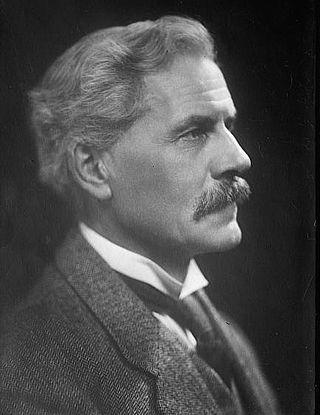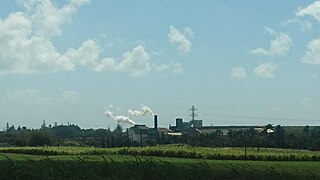Related Research Articles

Aberavon is a constituency represented in the House of Commons of the Parliament of the United Kingdom since 2015 by Stephen Kinnock of the Welsh Labour Party. It includes the town of Aberavon, although the largest town in the constituency is Port Talbot.

James Ramsay MacDonald was a British statesman and politician who served as Prime Minister of the United Kingdom, the first who belonged to the Labour Party, leading minority Labour governments for nine months in 1924 and again between 1929 and 1931. From 1931 to 1935, he headed a National Government dominated by the Conservative Party and supported by only a few Labour members. MacDonald was expelled from the Labour Party as a result.

Port Talbot is a town and community in the county borough of Neath Port Talbot, Wales, situated on the east side of Swansea Bay, approximately eight miles from Swansea. The Port Talbot Steelworks covers a large area of land which dominates the south east of the town. It is one of the biggest steelworks in the world, but has been under threat of closure since the 1980s. The population was 31,550 in 2021, comprising about a fifth of the 141,931 population of Neath Port Talbot.

William Gallacher was a Scottish trade unionist, activist and communist. He was one of the leading figures of the Shop Stewards' Movement in wartime Glasgow and a founding member of the Communist Party of Great Britain. He served two terms in the House of Commons as one of the last Communist Member of Parliament (MP).

Aberavon is a town and community in Neath Port Talbot county borough, Wales. The town derived its name from being near the mouth of the river Afan, which also gave its name to a medieval lordship. Today it is essentially a district of Port Talbot, covering the central and south western part of the town. Aberavon is also the name of the nearby Blue Flag beach and the parish covering the same area.
The Ulster Unionist Labour Association (UULA) was an association of trade unionists founded by Edward Carson in June 1918, aligned with the Ulster Unionists in Ireland. Members were known as Labour Unionists. In Britain, 1918 and 1919 were marked by intense class conflict. This phenomenon spread to Ireland, the whole of which was part of the United Kingdom at the time. This period also saw a large increase in trade union membership and a series of strikes. These union activities raised fears in a section of the Ulster Unionist leadership, principally Edward Carson and R. Dawson Bates. Carson at this time was president of the British Empire Union, and had been predisposed to amplify the danger of a Bolshevik outbreak in Britain.

The National Union of Seamen (NUS) was the principal trade union of merchant seafarers in the United Kingdom from the late 1880s to 1990. In 1990, the union amalgamated with the National Union of Railwaymen to form the National Union of Rail, Maritime and Transport Workers (RMT).
Joseph Havelock Wilson, commonly known as Havelock Wilson or J. Havelock Wilson, was a British trade union leader, Liberal Party politician, and campaigner for the rights of merchant seamen.
The Labour Party is a centre-left social-democratic political party in Mauritius. It is one of four main Mauritian political parties along, with the Mauritian Militant Movement (MMM), the Militant Socialist Movement (MSM) and the Parti Mauricien Social Démocrate (PMSD). As a member of the Labour Party-MMM alliance, it elected four Members of Parliament in the general election of 2014. The party is led by Navin Ramgoolam.

The second MacDonald ministry was formed by Ramsay MacDonald on his reappointment as prime minister of the United Kingdom by King George V on 5 June 1929. It was only the second time the Labour Party had formed a government; the first MacDonald ministry held office in 1924.
Black Friday, in British labour history, refers to 15 April 1921, when the leaders of transport and rail unions announced a decision not to call for strike action in support of the miners. The epithet 'black' derives from a widespread feeling amongst labour radicals that the decision amounted to a breach of solidarity and a betrayal of the miners.

Robert Williams was a British trade union organiser.
This is a timeline of labour issues and events in Canada.
Usually referred to as the "New South Wales General Strike", but referred to by contemporaries as "the Great Strike", it was in fact neither general nor confined to NSW. The strike was however a mass strike, involving around 100,000 workers, mostly in NSW and Victoria. It began in the Australian state of New South Wales and spread to other states over six weeks from 2 August to 8 September 1917 when the official leadership declared the strike over. It took two weeks for all the railway strikers to return, however, as rank and file meetings initially rejected the official capitulation. Outside the railways, significant groups such as the waterside workers in Sydney and Melbourne, and the Hunter Valley coal mines remained out until November as in their case the use of strikebreakers had turned the strike into a lockout.

Mauritius was a Crown colony off the southeast coast of Africa. Formerly part of the French colonial empire, British rule in Mauritius was established de facto with the Invasion of Isle de France in November 1810, and de jure by the subsequent Treaty of Paris. British rule ended on 12 March 1968, when Mauritius became independent.
The 1913 Leicester by-election was a Parliamentary by-election held on 27 June 1913. The constituency returned two Members of Parliament (MPs) to the House of Commons of the United Kingdom, elected by the first past the post voting system.

Socialism in the United Kingdom is thought to stretch back to the 19th century from roots arising in the aftermath of the English Civil War. Notions of socialism in Great Britain have taken many different forms from the utopian philanthropism of Robert Owen through to the reformist electoral project enshrined in the birth of the Labour Party that was founded in 1900.
Guy Rozemont (1915–1956) was a Mauritian trade unionist and the third leader of the Mauritius Labour Party. He fought for workers' rights and voiced against the injustice done against them. He played a crucial role in shaping the government, political culture and foreign policy of modern Mauritius.

The Uba riots of 1937 or simply the Mauritian riots of 1937 refers to an outbreak of riots and civil disturbances that broke out amongst small scale sugar cane growers on the island of Mauritius in August 1937. The riots led to the death of 4 people with an additional 6 people being injured.
Maurice Curé (1886-1977) was one of the founders of the Labour Party in Mauritius in 1936.
References
- ↑ Martine Maurel (February 2007). Mauritius. New Holland Publishers. pp. 98–. ISBN 978-1-84537-647-5.
- 1 2 A New Comprehensive History of Mauritius Vol 1. Sydney Selvon. pp. 76–. ISBN 978-99949-34-94-2.
- ↑ Civil Registration Office, Port Louis, Mauritius, retrieved December 2015
- 1 2 3 4 Quenette, R.L., 1985, Emmanuel Anquetil, translated by Hayes, JP, Rivière, S. (2015), Mahatma Gandhi Institute, Mauritius
- ↑ The British Library, http://www.bl.uk/learning/timeline/item107595.html , retrieved 7 February 2018
- ↑ Wikipedia, 2018, Great Depression in the United Kingdom, retrieved February 2018.[ better source needed ]
- ↑ Wikipedia, 2018, Aberavon (UK Parliament constituency)#Members of Parliament, retrieved February 2018[ better source needed ]
- ↑ IBP, Inc. (1 June 2015). Mauritius Criminal Law Regulations and Procedures Handbook - Strategic Information, Regulations, Procedures. Lulu.com. pp. 38–. ISBN 978-1-5145-0756-8.
- ↑ Anand Mulloo (2007). Voices of the Indian Diaspora. Motilal Banarsidass. pp. 96–. ISBN 978-81-208-3197-1.
- ↑ Paul Younger (29 October 2009). New Homelands: Hindu Communities in Mauritius, Guyana, Trinidad, South Africa, Fiji, and East Africa. Oxford University Press. pp. 50–. ISBN 978-0-19-045298-8.
- ↑ Story of the Independence of Mauritius, M. Chintamunnee, Star Publications (P) Ltd, India
- ↑ The Diary of Sheila, L'Atelier d'ecriture, 2012
- ↑ Advance, 5 March 1959